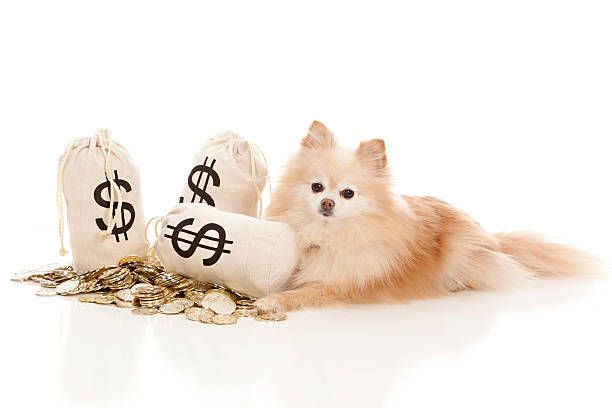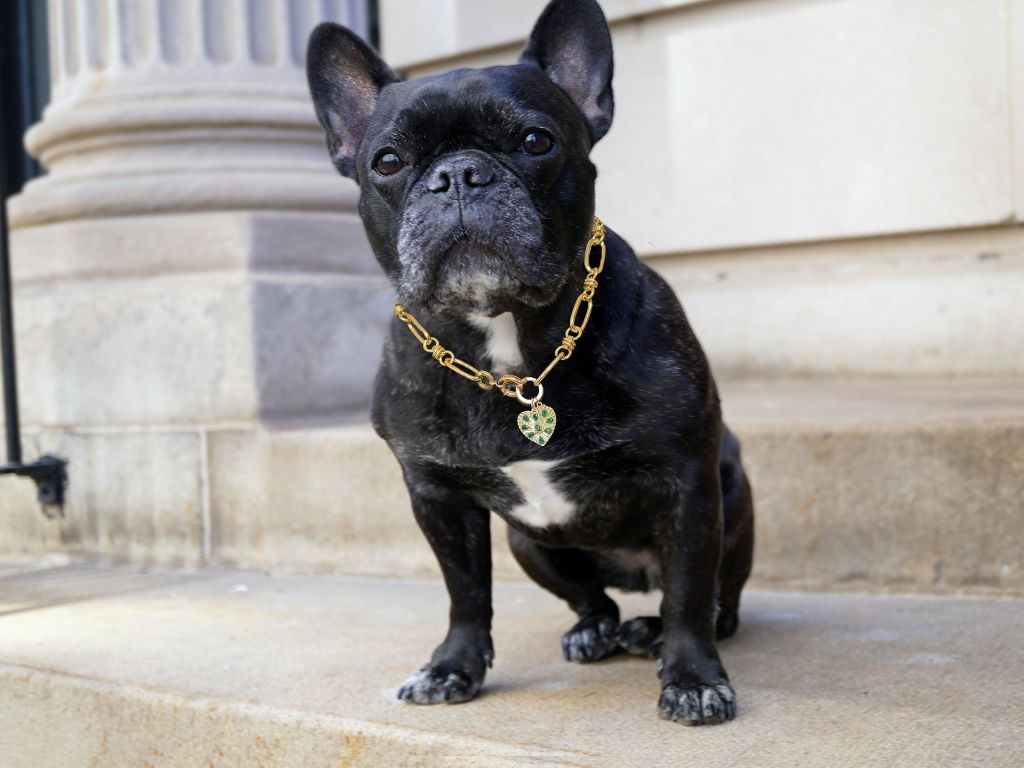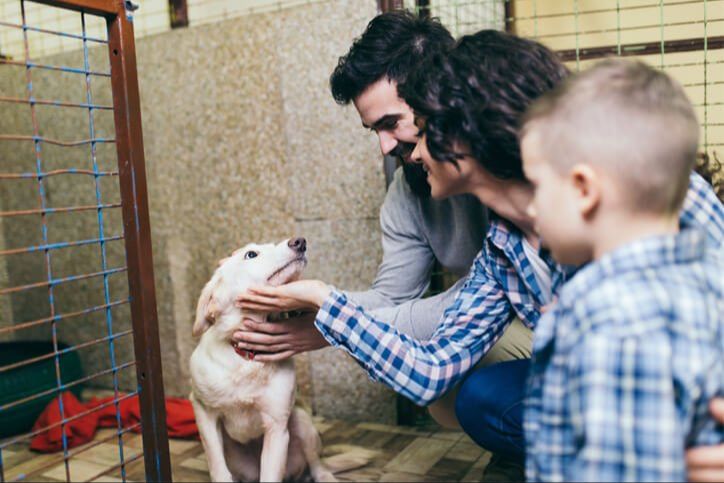Introduction
Many cultures throughout history have believed certain dogs to bring good luck and wealth to their owners. The idea of a “lucky dog” has become popular due to several factors – some breeds are thought to have innate traits believed to attract fortune, like loyalty or high energy, while some physical features are considered lucky, like curly tails or light fur. Owning dogs has also been symbolically tied to prosperity. This article will provide an overview of the history of lucky dogs, detail breeds often believed to be lucky, explain the reasoning behind lucky dog mythology, and offer tips on choosing and caring for a dog thought to bring good luck.
The History of Lucky Dogs
The origin of the lucky dog dates back thousands of years in many cultures around the world. In ancient China, pugs were considered good luck due to their resemblance to Chinese lucky charms. The pug’s curled tail was thought to resemble the Chinese character for “prince”. Pugs were treasured by Chinese Emperors and ownership of the dogs became a status symbol.1
In ancient Egypt, dogs like the Basenji were appreciated for their hunting abilities and loyalty. Mummified dogs have been found buried with pharaohs, signifying their importance. Anubis, the jackal-headed Egyptian god of the afterlife, cemented the dog’s lucky symbolism in Egyptian culture.2
In Western culture, black dogs have traditionally been considered lucky in the UK, possibly due to associations with the mythological black dog as a guardian. During the Renaissance, wealthy women often kept lapdog pets like Cavalier King Charles Spaniels as status symbols. Their petite size made them portable good luck charms.3
The origin of the American Lucky Dogs cart dates back to 1947 in New Orleans when Steven Loyacano Sr. opened the first hot dog cart. The Lucky Dogs stands expanded across the French Quarter and became iconic New Orleans street food.4 Their convenient access made them popular late-night snacks in the party city.
Breeds Considered Lucky
Certain dog breeds are often associated with bringing good luck and fortune. While there’s no definitive scientific proof that particular breeds actually impact luck, some have strong symbolic ties to prosperity in various cultures and belief systems.
Here are some of the most popular dog breeds believed to be lucky:
Pomeranians
With their fluffy coats and foxy faces, Pomeranians are a beloved small breed. These little dogs have long been considered good luck charms, especially in their native land of Germany where they’re known as “Pomms.”
According to German superstition, having a Pomeranian around attracts financial prosperity. Their vivacious and cheerful nature is thought to spread good fortune wherever they go (Source).

French Bulldogs
The French Bulldog is a hugely popular breed today, but they have long been associated with luck. In their past as mascots on old sailing ships, having a cheerful “Frenchie” on board was considered lucky for safe voyages. The breed’s connection to good fortune made them highly desired by socialites and personalities during the Victorian era.
Today, Frenchies are prized companions that many still believe attract favorable circumstances. Their fun-loving nature and amusing antics seem to spread good vibes (Source).

Golden Retrievers
With their friendly smiles, Golden Retrievers have a perpetually sunny disposition. In Chinese culture, Golden Retrievers signify future prosperity and success. It is believed that having one of these cheerful dogs in your life helps attract wealth and good fortune.
The breed’s eager-to-please nature and high trainability also make them excellent service dogs in fields like search-and-rescue and supporting people with disabilities. So Golden Retrievers lend both literal assistance and symbolic “good luck” wherever they go.

Why Certain Breeds are Lucky
Certain dog breeds are considered luckier than others for a variety of reasons relating to their personality traits, physical appearance, and origin stories. According to Chinese astrology, dogs with curly tails like Pugs and Shih Tzus are believed to bring good fortune and prosperity into the home (Reddit). Their curled tails resemble Chinese coins, symbols of wealth and abundance. Golden Retrievers are also thought to attract fortune due to their golden coloring, which represents vitality and prosperity in feng shui principles.
Breeds like Labrador Retrievers and Beagles are considered lucky thanks to their friendly, lovable personalities that uplift the energy of a home. Their affectionate and loyal dispositions are believed to invite happiness and positivity. Certain energetic and spunky breeds like Jack Russell Terriers are associated with luck because of their lively spirit and enthusiasm. Their playful antics are thought to spread joy and ward off negativity.
In Chinese culture, black dogs are seen as especially lucky since black is an auspicious color representing heaven and the northern sky. Breeds like Black Labs are popular choices believed to safeguard homes against evil influences. No matter what their physical characteristics, dogs renowned for loyalty like German Shepherds have a lucky reputation for symbolizing protection and devotion in many cultures.
Lucky Dog Superstitions
There are many common superstitions surrounding dogs and the luck they can bring. According to one superstition, it’s considered good luck if a dog enters your house or follows you home (Mythbusters – 5 superstitions about dogs). This is thought to signify coming prosperity. Similarly, in some cultures, feeding stray dogs is believed to bring good fortune.
Letting dogs lick you is thought to bring luck in gambling and business ventures, according to some traditions. There are also many superstitions around dog poop bringing good luck if stepped in accidentally (Mythbusters – 5 superstitions about dogs). This stems from the belief that dogs symbolize prosperity.
Conversely, there are also superstitions about dogs bringing bad luck. For example, in some traditions, a howling dog is seen as an omen of death (The 9 Craziest Dog Superstitions (#2 is Terrifying)). Black dogs in particular are thought by some to signify ill fortune if they follow you.
Feng Shui Tips for Lucky Dogs
In feng shui, thoughtful placement of dog-related items and areas in your home is believed to enhance the luck and prosperity these animals bring. Here are some tips:
The front door is considered the “mouth of chi” in feng shui. Placing dog motifs like statues here can symbolically guard your home’s entrance. But beware of positioning dogs directly facing the front door, which can symbolize them leaping at guests.
In the bedroom, dogs are thought to protect and bring fidelity to relationships. Position their images, like art or figurines, so they survey the room but don’t stare straight at the bed. [1]
Dogs are yang creatures, so balance their yang energy in yin areas like bedrooms with calm colors and rounded shapes. Use heavy dog statues or substantial beds to ground their active energy.
Avoid placing dog motifs like art directly behind you when seated at your desk. This “barking in your ear” position stresses productivity. [2]
In living rooms, position dogs near conversation areas to stimulate social gatherings. But don’t put dog statues staring from behind seating, which can make guests uneasy.
Kitchens benefit from dog energy, as dogs represent faithfulness. Place dog art or figures watching over the stove for fidelity and to symbolically “guard” your health as you cook.
Other Ways Dogs Bring Good Fortune
Beyond superstitions, dogs can bring many proven benefits that improve people’s lives. Studies have shown that petting dogs lowers blood pressure and reduces stress (according to The Strange Connection Between Pets And Good Luck). The companionship of dogs also helps fight loneliness and depression, especially for elderly individuals and those living alone.
Dogs motivate people to exercise by needing walks, which has positive effects on cardiovascular health. Owners have been found to have lower triglyceride and cholesterol levels. Pets also provide social interaction opportunities with other people during walks or trips to the dog park.
Working dogs provide crucial services such as guiding the blind, detecting drugs, and assisting police and military operations. Therapy dogs bring comfort to hospital patients, disaster victims, and students during exam times. Overall, dogs enhance our lives in many science-backed ways beyond folklore or superstition.
Considerations Before Getting a Lucky Dog
Bringing any new dog into your home is a big commitment that requires careful consideration. This is especially true when looking into breeds considered “lucky” dogs, as their unique traits may not suit every lifestyle.
Before deciding if a lucky dog is right for you, be sure to thoroughly research different breeds and their needs. For example, according to PetMD, it’s important to consider your daily routine and activity level. Some lucky dogs like Shiba Inus require regular exercise and mental stimulation. Others like Pugs are lower energy. Make sure your lifestyle can provide proper care.
Additionally, Pet Spyjamas notes the lifetime costs of dog ownership can be high. Food, medical expenses, grooming and supplies add up over the years. Be realistic about what you can budget for a lucky dog’s needs.
Doing breed research, assessing time commitments, and understanding costs are key considerations before getting a lucky dog. Make sure you can fully provide proper long-term care to give them their best life in your home.
Final Tips for Lucky Dogs
If you’re considering getting a dog believed to bring good luck and fortune, keep the following final tips in mind:
- While certain breeds may be associated with luck, any dog can be lucky if it receives love and care.
- Consider adopting a dog in need from a local shelter or rescue group instead of seeking out specific “lucky” breeds.
- Make sure you can properly care for and meet the needs of the dog breed you choose before getting one.
- Look into breed traits and temperament before making a selection to ensure the dog fits your lifestyle.
- In addition to food, water, shelter, exercise and training, dogs need affection and socialization for a happy life.
- Rather than just hoped-for luck, focus on the unconditional love and joy a dog can bring into your life.

While some breeds may be considered fortuitous, proper care and bonding will help any dog bring happiness and comfort. Remember adopting a dog is a long-term commitment, so make sure you are fully prepared before welcoming one home.
Conclusion
In summary, certain dog breeds like Golden Retrievers, French Bulldogs, and Poodles have long been associated with good luck and fortune. Superstitions around lucky dogs stem from cultural beliefs, legends, the dogs’ personalities, and physical traits. For example, Golden Retrievers are seen as lucky because they have golden fur, which symbolizes prosperity. French Bulldogs are lucky since they represent loyalty and perseverance. Poodles are intelligent and faithful companions that bring wisdom.
If you’re looking to get a dog that will bring good fortune, consider adopting one of the breeds mentioned. However, any dog can become your lucky charm if you treat them with love and care. The companionship and joy a dog brings are the real blessings. With responsible pet ownership, proper training, and affection, your dog will feel like good luck on four legs.